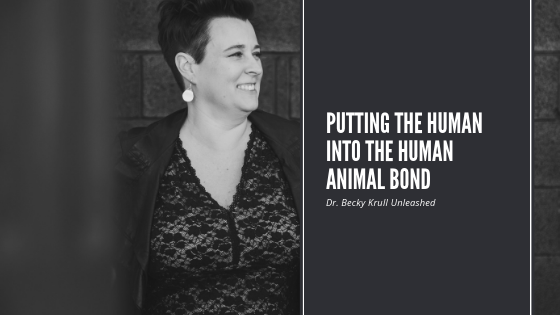
Putting the Human Into the Human Animal Bond
I recently read a veterinary blog that made me very sad for the veterinary author and our profession. The author shares why they no longer want to participate in connecting with their clients through the sharing of the client’s life stories, as irrelevant as they may be to the present situation at hand. The author expresses setting boundaries, hardening their heart and the emotional toll these stories take on the veterinarian. The author brought me back to once feeling the same way. I had lost connection with the people in my life by telling myself I didn’t have the time or compassion for their life and drama. The human of the human animal bond was lost. My stance and experiences have drastically shifted.
Relating to My Clients
Not a day passes that I don’t hear a story, either directly from my client or recounted by my staff, that does not pertain to the current health situation of my pet patients, no matter how off base it may seem. Knowing their story helps me relate to them, find a way to help solve their problems, and gives me better knowledge of how to craft my delivery so that I can get my message across, ultimately helping the pet.
When I have an elderly client with an elderly pet, and the client proceeds to tell me all their own ailments, it is likely the elderly client is highly sensitive to end of life care, because it means they are worrying about their own end of life. I can cater to their fears, using it as a prime time for education and relief. They just need someone to listen, and for a brief moment I can be that person.
Knowing family dynamics helps me understand that the husband works night shifts and feeds the pets when he gets home, but sometimes the wife forgets and she feeds them as well, explaining the recent weight changes of their pet. Or an elderly parent has moved into the house, the pet and parent both have dementia and the client is distraught over both. This presents the perfect opportunity for me to be of service to get them through this in the most loving way possible.
I haven’t seen your pet in over a year for their annual care, where have you been? Well Mr. had a severe home accident and Mrs. has been home on family medical leave taking care of him and they haven’t had the time or the money to think about Fluffy’s rabies vaccine.
I Am Not Your Therapist…
The author expresses that they are in fact not the client’s therapist and are not available for such stories, going as far as stating it is a waste of their time. Yes, these stories take up some time. I will gladly lose a moment of efficiency, for taking that extra five minutes in my day to listen to Mr. Smith during a euthanasia, tell me that this dog that is now leaving his world, was the rock that got him through his wife’s passing. That story is worth every minute I may be set behind in my day.
Healthy Boundaries Coupled With Coping Tools
Burnout with secondary trauma, PTSD and compassion fatigue exist because when we hear these stories, we take them on as our own. If we don’t have the tools to manage the emotions that come with them, we break. Boundaries in our profession are important, emotional, professional or physical. They are only part of the toolbox.
More Than Just Boundaries
In order to have enough compassion for our clients, pets and ourselves, much more than boundary setting must occur. We must learn to love ourselves, nurture our passions, nurture relationships and connections that make us human. Find ways to fill our cup and decrease the emotional burden. Dr. Eric Gentry, who specializes in compassion fatigue in caregivers, offers a few resources of self-regulation and breathing techniques, essential self-care recommendations and other antibodies to the disease of compassion fatigue. If we harden our hearts to our clients, it won’t be long until we harden to our staff and loved ones, just as I fell victim to.
We must process these emotions, take care of ourselves and learn how we can still hear the stories but not directly take on the trauma. Hiding our heads in the sand or simply refusing to hear the stories will disconnect us from the very ones that are paying our salaries!
Human Animal Bond
Humans are here on this earth to be connected and these stories are what connect us. I believe having the view that we are only responsible for the pet is not fostering the human animal bond we are so called to do. We must foster to the human part of that equation as well.
Lead With Love and Kindness
The author’s last comment rings the truest “Besides, why would any client want me as their therapist when I’m in desperate need of my own?” Although very tongue in cheek, perhaps it is time to find the help to give us the tools to continue to love veterinary medicine as well as the humans that make that work possible. I know that is exactly the predicament I found myself in not so long ago. I am now reconnected and loving the stories, being vulnerable and sharing my own piece of me with the world.
Do not harden your heart. Soften. Lead with love and kindness. Be vulnerable with your clients that are being so vulnerable with you. Otherwise it makes for a sad and lonely existence.
